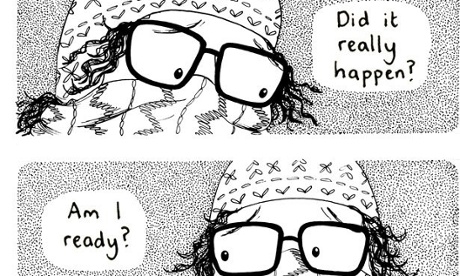
It must have been a difficult pitch: a free graphic novel about sexual assault survivors. However The Courage to Be Me by Dr Nina Burrowes is an uplifting, hopeful book about the human strength to overcome. The book depicts the journey of five survivors of sexual abuse over the process of group therapy, who are an amalgamation of the hundreds of real life accounts Borrowes, a forensic psychologist specialising in rape and violence, has been told.
On meeting Burrowes, I wondered how on earth someone specialises in rape and sexual violence - how do they cope? "When I tell people what I do for a living they jump to the toxic and the broken, and that is part of my work, but I would say in equal measure, is the stuff that doesn’t even occur to them. I get to meet the most amazing people, I get to sit with raw humanity."
One way of coping was taking up sketching lessons. And soon she decided drawing was the perfect way to distill psychology into a more human form. Before she knew it, Burrowes was penning graphic novels.
The book is for "people who don’t want to read it". This is the conversation Burrowes would like to have with the survivor who is still refusing to have any conversation at all. Despite its novelty, it seems the book is helping already. One woman emailed Burrowes to say she has finally called a helpline after a lifetime of silence. Another said she’d read it with her husband and only now did he understand why the abuse she’d experienced so long ago still affected her.
The simplicity of the images, the starkness of black and white drawings and the honesty of the text left me watery-eyed but also surprisingly positive in the courage depicted.
Courage, according to Burrowes, is not fearlessness, as it’s often defined, but ‘being fearful and doing it anyway’. No one, she says, is more courageous than those who come forward and share their experiences of abuse.
It felt like an apt time to be talking to Burrowes - post Saville, with the number of people coming forward to report sexual abuse on the rise, and several high trials of men facing charges of historic sexual assault.
People, it seems, are finding the courage to come forward. And yet just two weeks earlier I watched a woman I know break a 20 year silence, waking up one morning and deciding to drive to the police station to report domestic violence.
I witnessed her bravery dashed in the face of an uninterested (busy? understaffed? budget slashed? uncaring?) police force. After interviewing the perpetrator, police released him without charge, pointing out that there were no witnesses. Dangerous, clueless, and seemingly not giving a shit - I’m not sure which is worse.
If survivors find the courage to come forward, it must absolutely be met by a respectful response. It must be protected, encouraged and maintained.
The UK has falling CPS referral and conviction rates. Last year, a report from Yvette Cooper’s office found that 19,494 fewer cases of rape, child abuse and domestic violence were referred to the Crown Prosecution than two years before that, with a 14% fall in prosecutions.
As inspiring as Burrowes belief in courage is, even she recognises the problem: "Our individual psychology, each layer of our society, the systems around us, seem to me to be all stacked against the victim.
As inspiring as Burrowes belief in courage is, even she recognises the problem. "Our individual psychology, each layer of our society, the systems around us, seem to me to be all stacked against the victim.
"If you go through the list of what a victim has to go through, physically and emotionally and publicly. I’ve sat through court cases. It’s your life; you’re on trial."
How can we expect vunerable women to come forward, when the system is stacked against them, or when in my own experience, police officers didn’t bother to read a four page statement citing a long history of abuse it had taken a woman two decades to make. Why find the courage, if it’s only going to be undermined?
And yet a faulty system can not rob people of the courage they’ve already found. But it can prevent victims finding it again or, indeed, deter women from ever finding the courage. I thank Burrowes for illuminating the importance of courage; the strength it takes the individual to have that conversation, to make that phone call, to drive to the police station. But society must heed that courage and do everything they can to protect it.
@marisajbate

